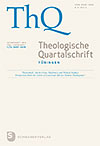archivierte
Ausgabe 1/2025 |


 |
      |
 |
|
|
|
|
 |
|
| Leseprobe 3 |
DOI: 10.14623/thq.2025.1.152–169 |
|
| Musa W. Dube |
| John 1:1–18: Reading the Fourth Gospel in the Context of Climate Change |
 |
Zusammenfassung
Die globale Erwärmung und ihre Auswirkungen sind für die Bürger:innen von Mutter Erde mittlerweile offensichtlich geworden. Extreme Wetterereignisse, von Hitzewellen bis hin zu häufigen und extremen Land- und Meeresstürmen, zeigen der Weltgemeinschaft, dass auf Mutter Erde nicht alles in Ordnung ist. Die „Verdammten der Erde“ werden in ihrer Subalternität an die äußersten Grenzen gedrängt. Das Zuhause ist fremd, gefährlich und ungemütlich geworden, was die Notwendigkeit einer gemeinschaftlichen und globalen Überprüfung des Gesundheitszustands von Mutter Erde und einer Ethik des Lebens in und mit der gesamten Erdgemeinschaft unterstreicht. Wissenschaftliche Untersuchungen und Daten belegen weitgehend, dass der Mensch im Zentrum der gegenwärtigen Umweltkrise steht. Wie wirkt sich der Kontext des Klimawandels und der Umweltkrise auf biblische Interpretationen aus? Wie sollten Interpret:innen des biblischen Textes diesen in Solidarität mit Mutter Erde lesen? Welche Ethik liegt der Lektüre des biblischen Textes durch das Prisma von Hitzewellen und extreme Wetterereignisse zugrunde? In diesem Artikel werden diese Fragen untersucht, indem das vierte Evangelium (Johannes 1:1–18) im Kontext des Klimawandels und der globalen Erwärmung gelesen wird.
Abstract
Global warming and its impact have become evident to the citizens of Mother Earth. Extreme weather events, ranging from heat waves to frequent and extreme land and sea storms, impress upon the global community that all is not well on Mother Earth. The wretched of the earth are being pushed to the extreme ends in their subalternity. Home has become strange, dangerous, and uncomfortable, underlining the need for communal and global introspection on the health of Mother Earth and the ethics of living in and with the whole Earth Community. Scientific research and data widely attest that human beings are at the center of contemporary environmental crisis. How does the context of climate change and environmental crisis impact biblical interpretation? How should interpreters of the biblical text read in solidarity with Mother Earth? What are the ethics of reading the biblical text within and through the heat waves and extreme weather events? This article will explore these questions by reading the Fourth Gospel (John1:1–18) within the context of climate change and global warming.
Schlüsselwörter/Keywords
Johannes 1; Christologie; gendersensible grüne Lektüre; Klimawandel; Mutter Erde; Lebensethik
John 1; Christology; gender-sensitive green reading; climate change; Mother Earth; ethics of living
Introduction: Zebras and Elephants
There is a beautiful Zebra moving within this script! Can you see it? Wow! Well, it is my pleasure to inform you that with my magic wand I have now conferred the status of Zebras upon all of you, my readers. You have just changed! You are now all beautiful, striped Zebras! You see, my last name, Dube, means Zebra! So, I am the beautiful Zebra, in case you are still searching for the beautiful Zebra moving in this article. Culturally, when I greet strangers, I say “Hello Dubes,” that is, Zebras.” I confer my identity on them to perform several acts. First, it serves to inform them of my communal identity. In the ideal Southern African setting, where everyone was born to a community that identified themselves with a particular animal, they would reply and greet me with their own totemic identity. So, it would be, for example, ‘Hello Elephant,’ if my acquaintance comes from the Elephant-identifying community. Second, identifying my acquaintance with my totemic identity is an act of hospitality, for in conferring my communal identity on a stranger, I perform a welcoming act. My greeting declares that the stranger is welcome among us (the Dubes); s/he is one with us and their human dignity is affirmed. Although I am unknown to them, they confer their communal identity on me, thereby introducing themselves, recognizing my dignity and welcoming me as member of their community. The act of greeting embodies and performs the ubuntu philosophy which holds that, “I am because we are” namely, that my humanity is inseparably tied to the other who is different from me; and that our difference should be welcomed and celebrated instead of being used as a reason to discriminate, marginalize or even kill the other.1
But what about the identity of the totemic animal? Such an animal is highly revered by its community. The identifying community does not kill, eat, touch, or use any part of that animal for any product whatsoever. The totemic animal is sacred to the community that identifies with it. They compose poems to praise the animal and to praise themselves. Consequently, when we identify ourselves as zebras, elephants, monkeys, lions, crocodiles, buffalos, for example, it is with great pride and honor. Sometimes even the whole region or village is named according to their totemic animal. One finds, for example, in South Africa a place called, “Kwa Dube,” that is, a place of Zebras. In Botswana we have a region consisting of various villages named, “Kweneng,” that is, a place of crocodiles. The numerous people found there call themselves, “Bakwena,” that is, the crocodiles.
In this philosophical thinking of Ubuntu, human identity is constructed as tied together with non-human communities in the circle of life. Human beings are inseparable from wild animals. Accordingly, day in and day out, until I die, I am a Dube, “a Zebra!” Wherever my name is written or will be written and spoken of, it will be mentioned in relation to the zebra, Dube. In fact, it is identified as a Zebra. My humanity, in other words, is inseparable from a Zebra, for I am groomed to understand that my human identity is interconnected with that of animals. In this Ubuntu philosophical understanding, all people are groomed to understand that human identity is tied to a wider creation community beyond human beings.2 Moreover, this philosophical perspective teaches the recognition of the divine in both human and animal communities. As I write elsewhere: [...]
Lesen Sie den kompletten Artikel in der Printausgabe.
|
|
|
|
|
|
|
Anzeigen
|
Mit Anzeigen und Inseraten erreichen Sie Ihre Zielgruppe. Anzeige aufgeben
|
 |
|
Unsere Dienstleistung für Verlage, die Ihr Abogeschäft in gute Hände geben wollen.
|

mehr
Informationen
|
 |
|
| Bücher & mehr |

|
|

